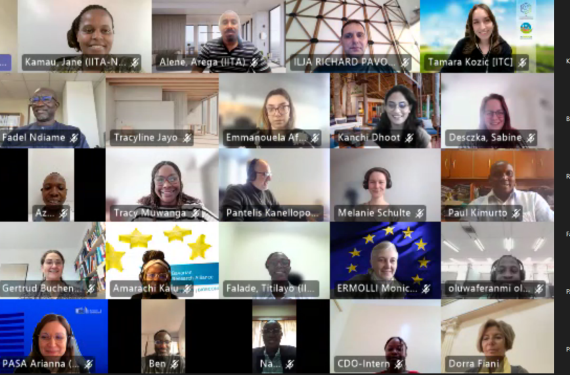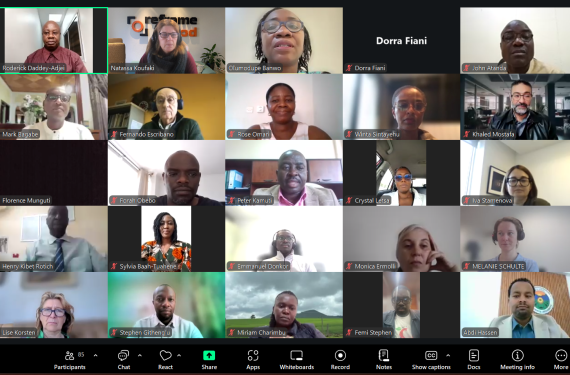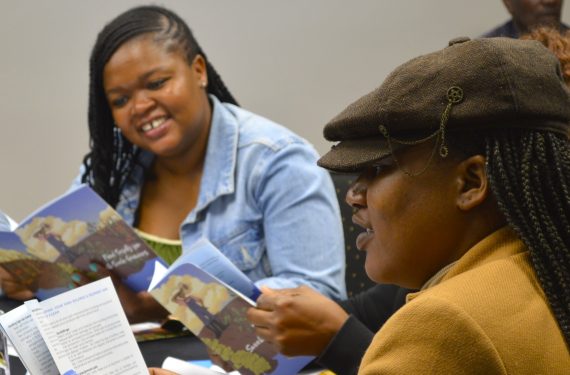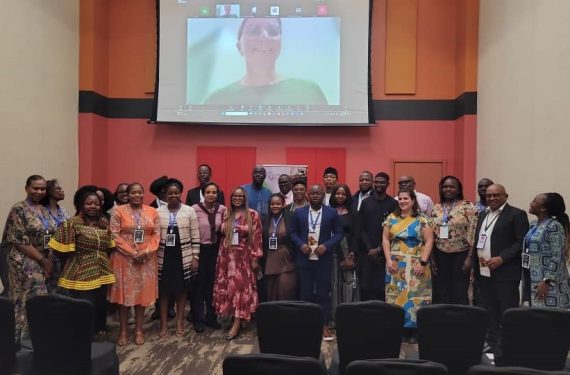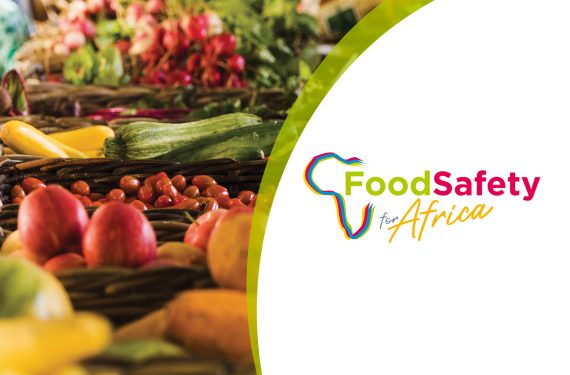Recent news
Addressing Food Safety Challenges
in the African Informal Sector
through innovative strategies and use cases
Addressing Food Safety Challenges
in the African Informal Sector
through innovative strategies and use cases
FS4Africa
What is it about?
FS4Africa aims to improve African food safety systems – with particular attention to the informal sector – through local market transformation enhancing food security and regional trade while reducing negative impacts on the environment, biodiversity, health, and society.
PARTNERS
0
COUNTRIES
0






Key Objectives
FS4Africa’s Vision
Gain a better understanding of the role of food safety
by analyzing the enabling environment, local value chains and use cases generating data and evidence on trade actors in the informal sector.
Develop governmental policies, business concepts and tools
that transform local markets to improve food safety in the informal sector and possible integration into the formal food system.
Co-develop and co-create solutions and business cases
in multi-actor-based approaches for food safety.
Incubate, accelerate and upscale solutions through a network of Innovation Hubs
involving and training local SMEs, start-ups and entrepreneurs in view of lower cost for certification and conformity assessment.
Assess the impact of food safety solutions, reducing their risks
on food security, circularity, sustainability and biodiversity.
Embed the food safety solutions in strategic agendas
for policy making and research by engagement with stakeholder and society.
FS4Africa General Assembly | February 2026
The Food Safety for Africa (FS4Africa) consortium successfully conducted its
“Africa Food Safety Operators Network” an African Food Safety Database Network Officially Launched
On 17 December 2025, the African Union Development Agency (AUDA-NEPAD),
Strengthening Good Agricultural Practices through workshops and theater
In August 2025, the FS4Africa project, together with the University
McGill Convergent Innovation Webinar: Digital Innovation and Governance in Kenya’s Maize Milling Sector
On 4 December 2025, McGill University’s Convergent Innovation Webinar Series
Food Safety at the centre of agrifood systems transformation
Insights from the 21st CAADP Partnership Platform and the 16th
FS4Africa Open Call 1: 404 proposals, 45 countries, and a shared vision for safer food in Africa
The FS4Africa Open Call 1 attracted a remarkable 404 proposals
Newsletter Subscription
Learn more about the project
Use Cases

Use Case 1:
Sustainable Aflatoxin Management
through a Food Convergence Innovation approach
Aflatoxin control through (1) breeding for aflatoxin resistance in staple crops of maize and groundnut with vitamin E in Kenya and (2) strengthening of collaborative networks sustainably through a food convergence innovation in Nigeria and Ghana. The objective is to introduce mycotoxin management.
Value chain: Groundnut and maize varieties
Participating Countries: Nigeria, Ghana, Kenya

Use Case 2:
Reduction in the use and
misuse of pesticides
Promote solutions that minimize the misuse of pesticides during production and in the post-harvest management of legumes and vegetables. Capacity development on the use of hermetic storage including the use of PICS bags and other strategies to reduce the risk of dietary exposure to pesticide residues, persistence of pesticide residues in the environment, antibiotic resistance to livestock from excessive exposure to pesticides.
Value chain: Legumes and Vegetables
Participating Countries: Benin, Ghana, Nigeria

Use Case 3:
Safe and healthy vegetable and fish production through online platform and mobile communication
Ensure the safety of the water recirculated within Recirculating Aquaculture Systems (RASs) growing both cultured fish and vegetables, and products harvested from these facilities for use as food.
Value chain: Aquacultures (fish and vegetables)
Participating Countries: Nigeria, Cameroon

Use Case 4:
Microbiological quality of tomatoes
and leafy greens from farm to fork
Eliminate the contamination of tomatoes and leafy greens (produced and sold by smallholder farmers) with bacterial pathogens such as Escherichia coli and Salmonella spp. due to unhygienic conditions during both the pre- and post-harvest stages of production.
Value chain: Tomatoes and Leafy greens
Participating Countries: South Africa
FS4Africa
Results
Food Safety policy inventory and recommendations
- Food Safety approaches and best practices (≥3 food safety approaches and best practices identified and analysed)
- Policy Recommendations (≥5 whitepapers with recommendations / guidelines)
Food Safety Knowledge Sharing Hub
- Food Safety Knowledge Platform
- Food safety legislative and regulatory landscape
- Guidelines for policy makers to improve food safety
Food Safety improvement framework
- 1 set of recommendations and suggestions for food safety hazards and management needs in the informal sector
- Food safety stakeholders e-map
- Advocacy and communication documentation (≥5 policy briefs for data-driven decision making by policy makers)
- Mezzanine food safety model approach (Model approach to uplift the informal sector to a semi-informal sector)
- 4 pilot systems to test and review the utility of the approach
- Lessons learnt from the use cases (Best practices and insights from the adoption of the solutions in the 4 use cases)
FS4Africa Ecosystem
- Use Case Catalogue
- FS4Africa innovation network (A vibrant and sustainable innovation ecosystem with ≥200 local stakeholders)
- Capacity building (≥10 Incubation and acceleration activities with ≥100 food system participants engaged in the incubation and acceleration activities)
- Open call innovative solutions (≥10 solutions developed and adopted)
FS4Africa
Food Safety Knowledge Platform
An online hub hosting the most relevant and practical knowledge on food safety for Africa. It will connect professionals and experts / expert organizations on the platform to facilitate knowledge exchange.
The platform will include real-time content and a community management system, consisting of the following:
- Food Safety content library, with dedicated taxonomy, filters and with ongoing curation to source relevant new content.
- Search Engine: The content database will be easily searchable, using dynamic search technology.
- Collaboration Tools: The platform will include a forum section for content collaboration.


OPEN CALLS
To fuel the growth trajectory of food safety solutions, FS4Africa will launch 2 Open Calls aiming at least at 15 projects in total providing Financial Support to Third Parties (FSTP), as a mechanism to maximize the project’s impact and accelerate network expansion.
- The 1st Open Call aims to provide financial support to research and technology stakeholders (start-ups, SMEs, research organizations and other multidisciplinary actors) to test, validate and enhance the business concepts and tools of the project or develop ideas and tools that contribute to project’s objectives which can then be introduced to the market.
10 projects for 10 Open Call 1 beneficiaries
(600k euro - up to 60k euro for each third party)
(600k euro - up to 60k euro for each third party)
- The 2nd Open Call aims to provide financial support to third parties (innovation hubs) to train use case partners, open call beneficiaries by providing mentoring and accelerating innovative business concepts, including social innovation and upscaling in view of African or European food business entrepreneurs and start-ups. The activities can be either virtual or in-person.
5 projects for 5 Open Call 2 beneficiaries
(200k Euro - up to 40k euro for each third party)
(200k Euro - up to 40k euro for each third party)
Our Recent Work
Recently Completed Projects
Lorem ipsum dolor sit amet consectetur adipiscing elit penatibsenectus, sem mus etiam pharetra lacus ac tortor vitae, amet tincidunt congue fusce ridiculus cubilia ad feugiat fames placerat
Project item not found!
Get in touch
Contact us
HAVE QUESTIONS? GET IN TOUCH!
